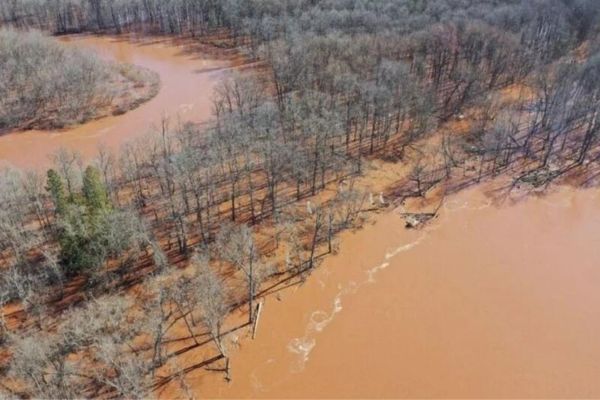
- Details
- By Darren Thompson
As well, Conley ordered the Canadian energy company to pay more than $5 million to the Bad River Band of Lake Superior Chippewa Indians for trespassing, plus a portion of the profits until the shutdown of the pipeline.
During Friday’s hearing, tribal representatives told the judge that the pipeline is at immediate risk of being exposed by erosion and rupturing on their land.
“The Band appreciates the Court putting an end to Enbridge’s flagrant trespass and disregard for our rights,” Bad River’s Tribal Chairman Mike Wiggins said n a statement on Monday. “Tribal sovereignty prevailed over corporate profits.”
The Bad River Band of Lake Superior Chippewa filed a lawsuit in 2019 against Enbridge, asking the company to remove 12 miles of the pipeline from the reservation because its easements to operate on the reservation expired in 2013.
Last September, Conley sided with Bad River, saying that Enbridge was trespassing on the reservation and must compensate the Tribe for operating illegally. However, the judge did not rule that the company shut down the pipeline, stating a shutdown would harm the economy of the Great Lakes region.
Line 5 is a 645-mile oil pipeline that transports 23 million gallons of crude oil and natural gas liquids from Superior, Wisconsin to Sarnia, Ontario, daily. The Bureau of Indian Affairs (BIA) granted Enbridge a 20-year easement to operate on all parcels of land on the Bad River Indian Reservation in 1952. In the early 1970s, the BIA renewed that easement for another 20-year term that would expire in June 1993.
In the early 1990s, Enbridge, the Bad River Band, and the BIA began discussions on the renewal of Line 5’s easement and determined that Enbridge would have to seek consent from each parcel of land on the Bad River Indian Reservation. Some parcels of land on the reservation are owned by the tribal government, while other parcels are owned by individual Native Americans held in trust by the U.S. Dept. of Interior.
Enbridge approached the Tribe with an offer of $800,000 for a 50-year easement and offered $450,000 for a 20-year easement if the BIA did not approve of the 50-year easement. The Tribal Council later passed two resolutions giving consent and approval for a 50-year easement over 13 wholly-owned parcels of land in exchange for $800,000. Fifteen other parcels of land had to be negotiated between the BIA and Enbridge.
When the 20-year easements expired in Jan. 2013, Enbridge submitted new applications for the 15 parcels of land to the BIA to renew another 20-year easement. When it submitted its applications, Enbridge failed to include documents showing that the owners of the land consented to the renewal.
Because of a 2010 oil spill in the Kalamazoo River that spilled more than 840,000 gallons in the river, Bad River raised questions about the safety of the pipeline. Enbridge failed to provide documents in its renewal applications that demonstrated additional safety measures it would take as a result of the spill.
Enbridge announced it plans to appeal Friday’s decision with the following statement:
“While the three-year timeline is arbitrary, it is achievable, provided government permitting agencies follow reasonable and timely processes. In 2020, Enbridge filed federal and state permit applications for the relocation of Line 5 around the Bad River Reservation, which is the long-term solution to this dispute. We urge prompt government action so this project can be completed within the next three years. The 41-mile relocation project will take less than one year to construct once those permits are issued.”
Representatives for the Tribe did not respond to a request for comment.
More Stories Like This
Trump signs law that revokes some limits on drilling in Alaska’s National Petroleum ReserveSouthern Sierra Miwuk Nation Gets 900-Acres ofLand Back
Chilkat Indian Village Tells New Palmer Mine Owners They Are “Not Welcome” in Chilkat Valley
Tribes, Coastal Group Ask Army Corps to Revoke Permit for Texas Export Terminal
Michigan Tribes Tell Supreme Court: Don’t Bail Out Enbridge
Help us defend tribal sovereignty.
At Native News Online, our mission is rooted in telling the stories that strengthen sovereignty and uplift Indigenous voices — not just at year’s end, but every single day.
Because of your generosity last year, we were able to keep our reporters on the ground in tribal communities, at national gatherings and in the halls of Congress — covering the issues that matter most to Indian Country: sovereignty, culture, education, health and economic opportunity.
That support sustained us through a tough year in 2025. Now, as we look to the year ahead, we need your help right now to ensure warrior journalism remains strong — reporting that defends tribal sovereignty, amplifies Native truth, and holds power accountable.
 The stakes couldn't be higher. Your support keeps Native voices heard, Native stories told and Native sovereignty defended.
The stakes couldn't be higher. Your support keeps Native voices heard, Native stories told and Native sovereignty defended.
Stand with Warrior Journalism today.
Levi Rickert (Potawatomi), Editor & Publisher

